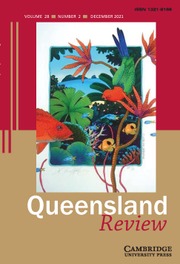Article contents
Writing from the Hinterland: Eleanor Dark's Queensland Years
Published online by Cambridge University Press: 26 February 2016
Extract
Eleanor Dark's years in Montville represent an unusual moment in the history of Queensland literature: it was one of the rare instances, until recent times, of an established professional writer moving to Queensland and pursuing her career in a small rural community. Since the 1980s, the Sunshine Coast and its hinterland have become something of a mecca for writers. None of the later arrivals, however, has pursued Dark's project of viewing the wider world from the hinterland. In Lantana Lane she intertwines meticulous observation of local life, in which she participated as a farmer, with wider cultural and political concerns. She transforms the apparently inauspicious location of the hinterland into a vantage point from which to reflect on modes of production, from the agricultural to the literary.
- Type
- Research Article
- Information
- Copyright
- Copyright © Cambridge University Press
References
Notes
1 Dark, Eleanor, diary, 26 Oct 1955, Mitchell Library Manuscript Collection 4545 Box 18.Google Scholar
2 Jane Thompson to Eleanor Dark, 12.5.[1959], 4545 Box 24; quoted in Barbara Brooks and Judith Clark, Eleanor Dark: A Writer's Life, Sydney: Macmillan, 1998, p 410.Google Scholar
3 See McKay, Belinda, Queensland Review,Google Scholar
4 Coungeau, Emily, ‘The Glasshouse Mountains, Queensland’, Stella Australis: Poems, Verses and Prose Fragments, Brisbane: Gordon and Gotch, 1914, p 30.Google Scholar
5 Emily Hemans Bulcock, Jacaranda Blooms and Other Poems, Brisbane: Queensland Book Depot, [n.d., 1923?], pp 23–24, 46.Google Scholar
6 Emily Hemans Bulcock, From Quenchless Springs, Brisbane: privately published, [1945].Google Scholar
7 Malouf, David, ‘Glasshouse Mountains’, The Year of the Foxes and Other Poems, New York: George Braziller, 1979, pp 28–29.Google Scholar
8 Palmer, Nettie, 19 January 1929, Nettie Palmer: Her Private Journal Fourteen Years, Poems, Reviews and Literary Essays, ed. Smith, Vivian, St Lucia: University of Queensland Press, 1988, pp 40–41.Google Scholar
9 Palmer, Vance, The Passage [1930], 1st Australian ed, Melbourne: Robertson and Mullens, 1944, p 279.Google Scholar
10 Eleanor Dark's essay, ‘The Blackall Range Country’ (Walkabout, 1 November 1955, pp 18–20), is similar in tone and subject matter to some of the chapters of Lantana Lane.Google Scholar
11 Dark, Eleanor, Lantana Lane, London and Sydney, Collins, 1959, p 101.Google Scholar
12 Astley, Thea, ‘Being a Queenslander: A Form of Literary and Geographical Conceit,’ Southerly 36, p 23.Google Scholar
13 Dark, Lantana Lane, p 101.Google Scholar
14 Dark, Lantana Lane, p 80.Google Scholar
15 Dark, Lantana Lane, pp 40, 252.Google Scholar
16 Dark, Lantana Lane, p 141. See Barbara Brooks and Judith Clark, Eleanor Dark: A Writer's Life, Sydney: Macmillan, 1998.Google Scholar
17 Dark, Lantana Lane, p 141.Google Scholar
18 Dark, The Little Company, Sydney: Collins, 1945, p 128.Google Scholar
19 Dark, Lantana Lane, p 252.Google Scholar
20 Dark, The Little Company, p 291. Gilbert Massey, while rejecting the reduction of his wife to an abstract problem, nonetheless suggests that she might be seen as an example of ‘Sex Ignorance and Female Parasitism as Factors in Maintaining the Capitalist Status Quo’.Google Scholar
21 Dark, Lantana Lane, p 251.Google Scholar
22 Dark, Eleanor, ‘Political Parties’, unpublished essay, Mitchell Library Manuscript Collection 4545 Box 10; quoted in Barbara Brooks, Eleanor Dark: A Writer's Life, Sydney: Pan Macmillan, 1998, p 306.Google Scholar
23 Dark, Lantana Lane, p 95.Google Scholar
24 Dark, Lantana Lane, p 103.Google Scholar
25 Dark, Lantana Lane, pp 253–254.Google Scholar
- 4
- Cited by


